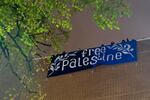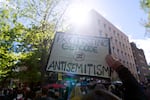
FILE: A small crowd stands outside the occupied Branford Price Millar Library at Portland State University, April 30, 2024. Demonstrators protesting the war in Gaza occupied the library for three days.
Kristyna Wentz-Graff / OPB
Portland State University’s administration is struggling to resolve a conflict within its own community: how to balance free speech among students, faculty and staff with the safety of everyone on campus.
As protests over the war in Gaza continue, many in the Portland State community are still processing the occupation of the university’s library and a response by the Portland Police Bureau in which officers forcibly pushed back protesters and used pepper spray. Students and staff say it’s the responsibility of the university administration to foster an environment that encourages free speech, restores a sense of safety and most of all rebuilds trust.
Portland State President Ann Cudd addressed the university’s Faculty Senate last week. She explained the thinking behind calling on the Portland Police Bureau to remove protesters occupying the school’s library rather than continuing to negotiate with the occupiers. She reiterated that she supports free speech, but Cudd said she draws the line at criminal activity.
“To those who have condemned our action of bringing the Portland Police on campus, I ask this: How long should I have allowed the protesters to stay in the library? How many times should I have offered students an opportunity to leave without consequences?” Cudd said.
Cudd also addressed some of the protesters’ demands. Among other things, they called on the university to back an immediate cease-fire in Gaza and to cut all ties with Boeing and other manufacturers that supply weapons and other military materials to Israel.
“We are not a political organization, and we do not have a foreign policy,” she said. “Taking an institutional stance chills the speech of those who would disagree.”
Last month, Cudd committed to pausing all financial connections and other programs associated with Boeing. Portland State has accepted philanthropic gifts from the aerospace company. Boeing also regularly recruits graduates from PSU’s School of Business.
Cudd also said she would take part in a debate regarding the ethics of PSU accepting money from Boeing. The debate has not yet been scheduled.
Comments and questions from faculty who attended the meeting reflected differing opinions on the occupation of the Branford Price Millar Library and other protests on campus. Several questions revolved around the library: the extent of the damage, how students would access resources during the remainder of spring quarter, when it would reopen, why protesters ended up occupying the library at all and if the university would press charges against protesters.
Portland State is still tallying the full cost of the damage but an initial assessment estimates it will cost the university about $750,000 to restore the library, according to a university spokesperson. This figure does not include additional costs to replace furniture and tech devices. Facilities staff at the school are hoping to reopen the building by the time fall quarter rolls around in September. Library staff have set up a satellite reference desk for students and the university is looking for alternative study spaces.
Cudd said students ended up on the library’s steps after being pushed off of the South Park Blocks by park rangers who were trying to prevent an encampment on April 29. The library is one of the few university buildings that does not require identification to enter. She also said Portland State would cooperate with prosecutors in the criminal cases of some protesters who were arrested.
Millar library staff who were also at the meeting said they felt traumatized and violated by the occupation. Some commented that they might never feel safe working in the building again. Another said they lost trust in the Portland State community as whole after learning some peers were unfazed by the destruction of the library.
Faculty sought clarification on free speech zones on campus, others called for a focus on antisemitism in the university’s campuswide anti-discrimination training and some defended the rights of students to protest peacefully on campus.
No trustees spoke at the meeting but the board expressed its full support of Cudd’s actions in a statement to the Portland State community last week.

FILE: A large sign is unfurled from the roof of the building while spectators cheer, as the occupation continued at Portland State University’s Branford Price Millar Library, May 1, 2024.
Kristyna Wentz-Graff / OPB
Feelings are still raw among those in the Portland State community, and students protesting the war in Gaza say they feel that trust with the university has broken down even more now that PPB officers have been invited on campus. Portland State already has its own campus safety and police officers on site.
Students have shown no signs of changing their stance. Last Friday night, protesters returned to the downtown campus. The university briefly issued a shelter in place order for people on campus. The Portland Police Bureau ultimately described the event as peaceful.
Erica Thomas, co-chair of the adjunct faculty union Portland State University Faculty Association, said many students protesting the war in Gaza still feel the same way they do today as they did three weeks ago. She believes students are unlikely to seek a solution to end protests until they feel heard.
“I would encourage the administration to actually take the protesters seriously, listen to what they have to say and really reflect on why this is happening,” Thomas said. “I don’t feel that that’s happened yet.”
Students OPB spoke to worried that free speech is being stifled on campus. Graduate student Sarabell Eisenfeld said a small pro-Palestine information gathering she organized at the university’s School of Social Work was quickly shut down last week.
“The administration came and told us that we couldn’t be there, that it was not a free speech zone,” said Eisenfeld, who is also a member of Jewish Voice for Peace, a nationwide group that describes itself as anti-Zionist. “There were six of us speaking with each other on couches in the hallway and we were told that was not OK.”
A university spokesperson said Portland State protects free speech and it has no free speech zones, designated campus areas in which people can peacefully protest. Some buildings on campus do have specific rules on things like banners and tabling.
According to Portland State’s free speech guide, the university does have discretion in reasonably regulating the time, place and manner of free speech on its campus. Rules for university-sanctioned protests or rallies differ based on where the event will take place, if the location is in a public area and how many people are expected to attend. Noise permits may be required by the city of Portland. Fees may also be required to reserve some spaces.
Eisenfeld said Portland State should be encouraging collaborative learning and community engagement, not asking students to pay fees and fill out paperwork to hold demonstrations.
Freshman Brady Roland agrees. Roland, who is a current member of the school’s student governing body, the Associated Students of Portland State University, said it’s up to the administration to create an environment where everyone on campus feels comfortable enough to discuss the war in Gaza.
“We’re trying to build this relationship where the administration isn’t scared of their students and where students aren’t scared of their administration,” Roland said.
Student government supports the demands of the student protesters.
Roland said the student government had previously passed resolutions requesting the university to cut ties with Boeing in 2016 and 2021. The group is currently drafting an updated resolution that reflects the ongoing protests and current situation in Gaza. ASPSU is also advocating for the Portland State chapter of the nationwide group Students United for Palestinian Equal Rights, or SUPER, to be represented in the promised debate on Boeing.
But the relationship between the university and SUPER is fraught. The student group is currently on probation after it organized a protest at a board of trustees meeting in January. The demonstration disrupted the meeting and led to some property damage, according to reporting from the university student newspaper, PSU Vanguard.
SUPER declined to comment on its status on campus.
The Portland State community has become even more divided amid the protests.
“It’s suddenly become binary: It’s either you’re Palestine or you’re Israel,” said Portland State student Katrina, who used only her first name out of fear for her physical safety. “Somehow you can’t be for both, which bothers me.”
Katrina, who is Jewish and Indigenous, said she sympathizes with the people of Palestine but is disturbed by an increase of antisemitic remarks and flyers on campus. Some students and staff who identify as Jewish say they fear for their safety if they publicly speak out against antisemitism. Others don’t trust the university to stand up for the free speech rights of Jewish people.

FILE: Hundreds of people attend a pro-Palestinian protest on Portland State University's campus on April 29, 2024.
Kristyna Wentz-Graff / OPB
Katrina worries that her fellow students do not realize that widely-used slogans in the pro-Palestine movement like “from the river to the sea” and “long live the intifada” come off as threatening to some people in the Jewish community.
“The problem is one thing alone doesn’t scream antisemitism,” Katrina said. “But when you put all of the pieces together, the wider picture is Jewish students aren’t safe on campus.”
Katrina is hoping to start a new student group that will educate the community about antisemitism. She is also part of a new university task force aimed at encouraging free speech and bridging the deep Israel-Palestine divide on campus.
Portland State also put together an academic freedom website for faculty and staff who wanted more guidance on how to discuss the current situation in Gaza with students. A campus advisory group reviews university policies on the process of staging sanctioned protests on campus.
The goal behind these initiatives is connection.
“We want to have a sense of responsibility to each other even when we disagree,” said Ame Lambert, Portland State’s vice president of global diversity and inclusion. “Very few people are just on one side or the other.”
Lambert acknowledged that many people in the campus community feel unheard and that communication has broken down since the occupation of Millar library. She’s hoping to create more spaces for connection and open dialogue on campus. But Lambert also knows that trust is earned, and university administration has a long road ahead to rebuild that trust.
“The Portland State community really cares about justice and for the most part we care about each other,” said Lambert. “I think it’s worth fighting for.”
Correction: An earlier version of this story misstated the form of nonlethal crowd deterrent used on Portland State protesters. Police used pepper spray. OPB regrets the error.
